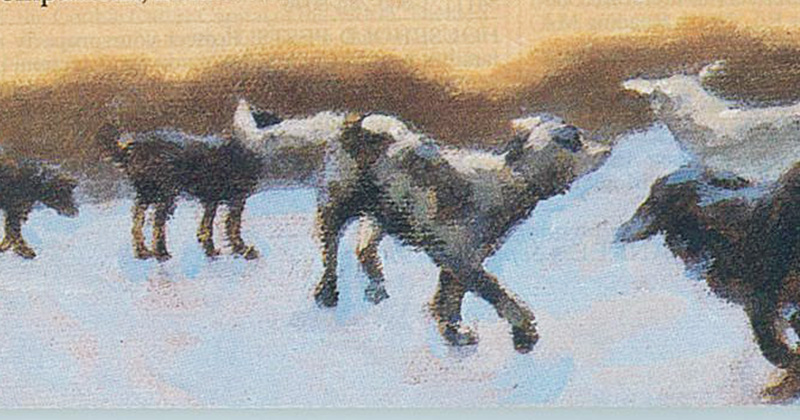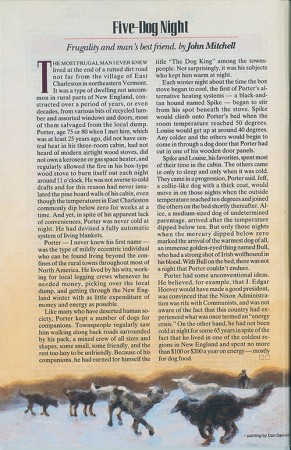Magazine
The Dog King
The most frugal man I ever knew lived at the end of a rutted dirt road not far from the village of East Charleston in northeastern Vermont. It was a type of dwelling not uncommon in rural parts of New England, constructed over a period of years, or even decades, from various bits of recycled […]

Coffee By Design | Portland, Maine
Photo Credit : Katherine Keenan The most frugal man I ever knew lived at the end of a rutted dirt road not far from the village of East Charleston in northeastern Vermont. It was a type of dwelling not uncommon in rural parts of New England, constructed over a period of years, or even decades, from various bits of recycled lumber and assorted windows and doors, most of them salvaged from the local dump. Porter, age 75 or 80 when I met him, which was at least 25 years ago, did not have central heat in his three-room cabin, had not heard of modem airtight wood stoves, did not own a kerosene or gas space heater, and regularly allowed the fire in his box-type wood stove to burn itself out each night around 11 o’clock. He was not averse to cold drafts and for this reason had never insulated the pine board walls of his cabin, even though the temperatures in East Charleston commonly dip below zero for weeks at a time. And yet, in spite of his apparent lack of conveniences, Porter was never cold at night. He had devised a fully automatic system of living blankets.
Porter — I never knew his first name — was the type of mildly eccentric individual who can be found living beyond the confines of the rural towns throughout most of North America. He lived by his wits, working for local logging crews whenever he needed money, picking over the local dump, and getting through the New England winter with as little expenditure of money and energy as possible.
Like many who have deserted human society, Porter kept a number of dogs for companions. Townspeople regularly saw him walking along back roads surrounded by his pack, a mixed crew of all sizes and shapes, some small, some friendly, and the rest too lazy to be unfriendly. Because of his companions, he had earned for himself the title “The Dog King” among the townspeople. Not surprisingly, it was his subjects who kept him warm at night.
Each winter night about the time the box stove began to cool, the first of Porter’s alternative heating systems — a black-and-tan hound named Spike — began to stir from his spot beneath the stove. Spike would climb onto Porter’s bed when the room temperature reached 50 degrees. Louise would get up at around 40 degrees. Any colder and the others would begin to come in through a dog door that Porter had cut in one of his wooden door panels.
Spike and Louise, his favorites, spent most of their time in the cabin. The others came in only to sleep and only when it was cold. They came in a progression, Porter said. Jeff, a collie-like dog with a thick coat, would move in on those nights when the outside temperature reached ten degrees and joined the others on the bed shortly thereafter. Alice, a medium-sized dog of undetermined parentage, arrived after the temperature dipped below ten. But only those nights when the mercury dipped below zero marked the arrival of the warmest dog of all, an immense golden-eyed thing named Bull, who had a strong shot of Irish wolfhound in his blood. With Bull on the bed, there was not a night that Porter couldn’t endure.
Porter had some unconventional ideas. He believed, for example, that J. Edgar Hoover would have made a good president, was convinced that the Nixon Administration was rife with Communists, and was not aware of the fact that this country had experienced what was once termed an “energy crisis.” On the other hand, he had not been cold at night for some 65 years in spite of the fact that he lived in one of the coldest regions in New England and spent no more than $100 or $200 a year on energy — mostly for dog food.
Excerpt from “’Five-Dog Night,” Yankee Magazine, September 1991.
The most frugal man I ever knew lived at the end of a rutted dirt road not far from the village of East Charleston in northeastern Vermont. It was a type of dwelling not uncommon in rural parts of New England, constructed over a period of years, or even decades, from various bits of recycled lumber and assorted windows and doors, most of them salvaged from the local dump. Porter, age 75 or 80 when I met him, which was at least 25 years ago, did not have central heat in his three-room cabin, had not heard of modem airtight wood stoves, did not own a kerosene or gas space heater, and regularly allowed the fire in his box-type wood stove to burn itself out each night around 11 o’clock. He was not averse to cold drafts and for this reason had never insulated the pine board walls of his cabin, even though the temperatures in East Charleston commonly dip below zero for weeks at a time. And yet, in spite of his apparent lack of conveniences, Porter was never cold at night. He had devised a fully automatic system of living blankets.
Porter — I never knew his first name — was the type of mildly eccentric individual who can be found living beyond the confines of the rural towns throughout most of North America. He lived by his wits, working for local logging crews whenever he needed money, picking over the local dump, and getting through the New England winter with as little expenditure of money and energy as possible.
Like many who have deserted human society, Porter kept a number of dogs for companions. Townspeople regularly saw him walking along back roads surrounded by his pack, a mixed crew of all sizes and shapes, some small, some friendly, and the rest too lazy to be unfriendly. Because of his companions, he had earned for himself the title “The Dog King” among the townspeople. Not surprisingly, it was his subjects who kept him warm at night.
Each winter night about the time the box stove began to cool, the first of Porter’s alternative heating systems — a black-and-tan hound named Spike — began to stir from his spot beneath the stove. Spike would climb onto Porter’s bed when the room temperature reached 50 degrees. Louise would get up at around 40 degrees. Any colder and the others would begin to come in through a dog door that Porter had cut in one of his wooden door panels.
Spike and Louise, his favorites, spent most of their time in the cabin. The others came in only to sleep and only when it was cold. They came in a progression, Porter said. Jeff, a collie-like dog with a thick coat, would move in on those nights when the outside temperature reached ten degrees and joined the others on the bed shortly thereafter. Alice, a medium-sized dog of undetermined parentage, arrived after the temperature dipped below ten. But only those nights when the mercury dipped below zero marked the arrival of the warmest dog of all, an immense golden-eyed thing named Bull, who had a strong shot of Irish wolfhound in his blood. With Bull on the bed, there was not a night that Porter couldn’t endure.
Porter had some unconventional ideas. He believed, for example, that J. Edgar Hoover would have made a good president, was convinced that the Nixon Administration was rife with Communists, and was not aware of the fact that this country had experienced what was once termed an “energy crisis.” On the other hand, he had not been cold at night for some 65 years in spite of the fact that he lived in one of the coldest regions in New England and spent no more than $100 or $200 a year on energy — mostly for dog food.
Excerpt from “’Five-Dog Night,” Yankee Magazine, September 1991.







